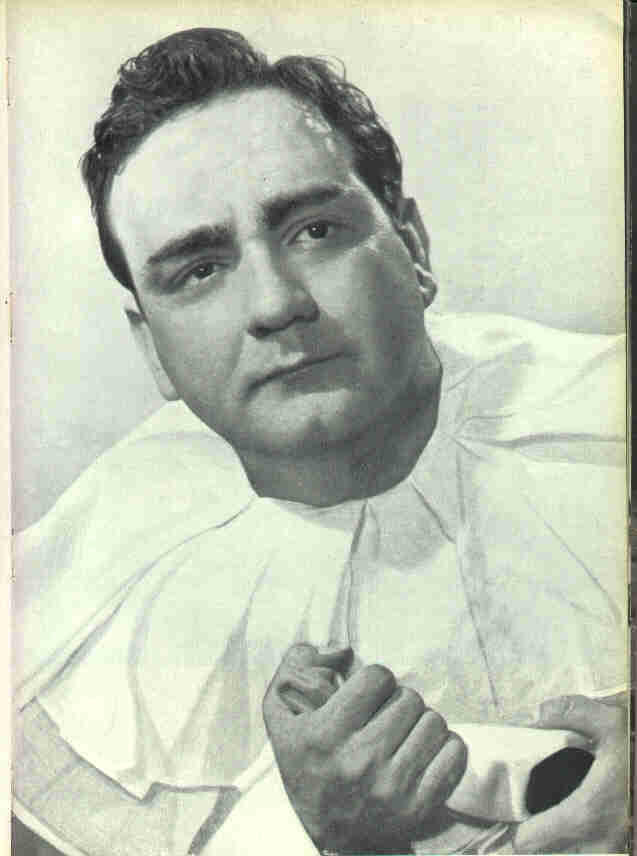Rafael Lagares
He studied with Guido Frati and made his debut in 1940 in Buenos Aires as Cavaradossi (I don't know at which theater, but not at the Colón,
where he appeared for the first time in 1948, as Alfredo and again as Cavaradossi). He built a good career throughout Latin America, was
regularly at the Colón until 1954, sang in Mexico City or in Santiago de Chile (1943, Tosca; 1955, Lucia, Rigoletto, Carmen and
Trovatore).
His North American debut took place at the New York City Center Theater on 8 November 1945, singing Alfredo, and was an immediate success.
Within one month, his first performance at the Academy of Music in Philadelphia followed (Trovatore). His "Di quella pira" stopped the show and
received nine curtains calls from a wildly enthusiastic audience. Again, the critics were lavish in their praise. Lagares scored another hit
when he appeared as guest star of the spring opera season at New York City Center Theater: although he had never studied the score of Aida until
two weeks before, his opening night performance as Radamès resulted in a brilliant personal triumph.
In Europe, he appeared at La Scala, at the San Carlo in Naples, the Fenice in Venice, the Terme di Caracalla in Rome, the Liceu in Barcelona, the
Teatro de la Zarzuela in Madrid, the São Carlos in Lisbon or the Stadsschouwburg in Amsterdam.
All that, however, with a decisive break: Lagares had been a
supporter of the populist, leftist (but anticommunist) Argentinean president Juan Perón. One of Perón's politics was to bring the
working class into the opera theaters (partly successful!), and Lagares was one of "his" singers at the Colón. The right-wing military
dictatorship that ousted Perón in 1955 was fierce enough to prosecute even artists and athlets that had been involved with Peronism –
and forced Lagares into exile! Only in 1974, he returned (Perón and his movement had regained power in 1973).
In his younger years, Lagares' resemblance to Enrico Caruso was striking, and Dorothy Caruso chose him for the film "The great Caruso". It didn't
work out, and the role was given to Mario Lanza instead...
Reference 1: Página 12, 5 June 2003; reference 2
Repertory: Aida, Andrea Chénier, Aurora (by Panizza), Madama Butterfly, Ballo in Maschera, Simon Boccanegra, La bohè:me, Carmen, Cavalleria rusticana, Don Carlo, Ernani, Fanciulla del West, Faust, Fedora, Forza del destino, Gioconda, Lin-Calel (by d'Espósito), I lombardi alla prima crociata, Lucia di Lammermoor, Marina, Manon Lescaut, Norma, Otello, Pagliacci, Rigoletto, Siberia, Traviata, Trovatore, Tosca, Zincali (by Boero).
HMV, Milano, 21 March 1952 2BA7984-1 Norma (Bellini): Meco all'altar ... Me protegge DB 11354 0BA7985-2 Fedora (Giordano): Amor ti vieta DA 11336 2BA7986-1 Cavalleria rusticana (Mascagni): Mamma, quel vino DB 11354 0BA7987-1 Cavalleria rusticana (Mascagni): O Lola DA 11336 HMV, Milano, 1952 Carmen (Bizet): Ah! mi parla di lei, pt. 1 (w. Papagni) DB 11352 Carmen (Bizet): Ah! mi parla di lei, pt. 2 (w. Papagni) DB 11352 RCA Victor, Buenos Aires, 1954 Los gavilanes (Guerrero): Flor roja 68-0925, LP AGL18 El huésped del sevillano (Guerrero): Fiel espada triunfadora 68-0925, LP AGL18 El huésped del sevillano (Guerrero): Mujer de los negros ojos 68-0926, LP AGL18 Marina (Arrieta): Costa la de levante 68-0926, LP AGL18 Doña Francisquita (Vives): Por el humo se sabe LP AGL18 Aurora (Panizza): Canto a la bandera Himno del reservista (Valenzuela del Fierro) Lolita (Buzzi-Peccia) 68-2054 Serenata sincera (Martelli) 68-2054 RAI, Torino, 14 June 1957 (radio recording) I lombardi alla prima crociata (Verdi) - complete role: Oronte w. Magda László, Lucilla Udovich, Aldo Bertocci, Plinio Clabassi; Fulvio Vernizzi I wish to thank Richard J Venezia for the recording (Norma). I wish to thank Eduardo Marcelino Herrera for contributing to the discography. I wish to thank Roberto Falcone for this information the picture and the recordings (Cavalleria, Lin-Calel). I would like to thank Juan Dzazópulos for several corrections and additions. | |
